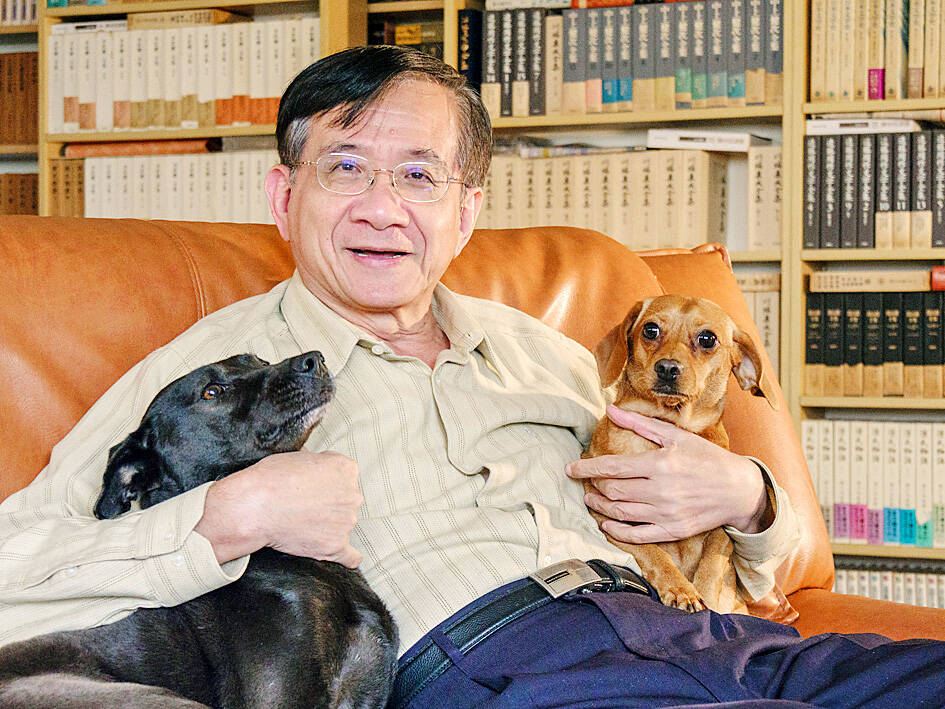A new Chinese translation of the Japanese literary classic The Tale of Genji by translator Lin Shui-fu (林水福) is to be published in the second half of this year.
In an interview, Lin told the Central News Agency that he was motivated to present a novel interpretation of The Tale of Genji by his belief that the “classics never grow old.”
Lin, who took more than four years to produce the 900,000-character work, is the third person to publish a Chinese translation of the book after Lin Wen-yueh (林文月) in the 1970s and Feng Zikai (豐子愷) in 1980.

Photo courtesy of Lin Shui-fu
The Tale of Genji, written by Murasaki Shikibu in the early 11th century in archaic Japanese, is considered by some to be the world’s first novel.
However, even in modern Japanese, new translations emerge roughly once every two decades, Lin Shui-fu said.
PINNACLE
“The Tale of Genji, in particular, stands as the highest pinnacle of Japanese literature. Writer Yasunari Kawabata, speaking during his 1968 Nobel Prize acceptance speech, argued that ‘even today, no piece of fiction has matched its significance,’” he said.
Lin Shui-fu emphasized that there is no better cultural icon for Japan than The Tale of Genji, which profoundly influences the aesthetics of the nation’s culture, literature and other fields.
The story revolves around the romantic pursuits of Hikaru Genji, the son of Japanese Emperor Kiritsubo and his consort, and three generations of his descendants during the Heian period (794 to 1185), Lin Shui-fu said.
The masterpiece is anticipated to be instilled with a new life by Lin Shui-fu, a heavyweight in Japanese-to-Chinese translation in Taiwan who earned his doctorate at Japan’s Tohoku University.
HEIAN LITERATURE
Renowned for translating major works by Kawabata, Jun’ichiro Tanizaki, Kenzaburo Oe and others, Lin Shui-fu said that The Tale of Genji is the work he desired to translate the most, given his enduring interest in Heian literature.
He began his work after retiring from Southern Taiwan University of Science and Technology in 2018, translating about 2,000 words a day.
While that workload is more substantial than before his retirement, the 71-year-old translator enjoys the process.
Having mastered more than 1,000 waka, a form of classical Japanese poetry, before studying in Japan, he anticipates that his knowledge of the form would contribute to the distinction between his translation and the two preceding translations of The Tale of Genji, which include more than 700 waka.

TRAFFIC SAFETY RULES: A positive result in a drug test would result in a two-year license suspension for the driver and vehicle, and a fine of up to NT$180,000 The Ministry of Transportation and Communications is to authorize police to conduct roadside saliva tests by the end of the year to deter people from driving while under the influence of narcotics, it said yesterday. The ministry last month unveiled a draft of amended regulations governing traffic safety rules and penalties, which included provisions empowering police to conduct mandatory saliva tests on drivers. While currently rules authorize police to use oral fluid testing kits for signs of drug use, they do not establish penalties for noncompliance or operating procedures for officers to follow, the ministry said. The proposed changes to the regulations require

The Executive Yuan yesterday announced that registration for a one-time universal NT$10,000 cash handout to help people in Taiwan survive US tariffs and inflation would start on Nov. 5, with payouts available as early as Nov. 12. Who is eligible for the handout? Registered Taiwanese nationals are eligible, including those born in Taiwan before April 30 next year with a birth certificate. Non-registered nationals with residence permits, foreign permanent residents and foreign spouses of Taiwanese citizens with residence permits also qualify for the handouts. For people who meet the eligibility requirements, but passed away between yesterday and April 30 next year, surviving family members

Taiwanese officials are courting podcasters and influencers aligned with US President Donald Trump as they grow more worried the US leader could undermine Taiwanese interests in talks with China, people familiar with the matter said. Trump has said Taiwan would likely be on the agenda when he is expected to meet Chinese President Xi Jinping (習近平) next week in a bid to resolve persistent trade tensions. China has asked the White House to officially declare it “opposes” Taiwanese independence, Bloomberg reported last month, a concession that would mark a major diplomatic win for Beijing. President William Lai (賴清德) and his top officials

The German city of Hamburg on Oct. 14 named a bridge “Kaohsiung-Brucke” after the Taiwanese city of Kaohsiung. The footbridge, formerly known as F566, is to the east of the Speicherstadt, the world’s largest warehouse district, and connects the Dar-es-Salaam-Platz to the Brooktorpromenade near the Port of Hamburg on the Elbe River. Timo Fischer, a Free Democratic Party member of the Hamburg-Mitte District Assembly, in May last year proposed the name change with support from members of the Social Democratic Party and the Christian Democratic Union. Kaohsiung and Hamburg in 1999 inked a sister city agreement, but despite more than a quarter-century of